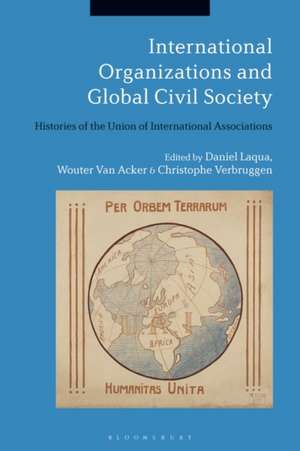International Organizations and Global Civil Society: Histories of the Union of International Associations
Editat de Daniel Laqua, Wouter Van Acker, Christophe Verbruggenen Limba Engleză Hardback – 20 mar 2019
| Toate formatele și edițiile | Preț | Express |
|---|---|---|
| Paperback (1) | 225.12 lei 6-8 săpt. | |
| Bloomsbury Publishing – 16 sep 2020 | 225.12 lei 6-8 săpt. | |
| Hardback (1) | 656.90 lei 6-8 săpt. | |
| Bloomsbury Publishing – 20 mar 2019 | 656.90 lei 6-8 săpt. |
Preț: 656.90 lei
Preț vechi: 943.36 lei
-30% Nou
Puncte Express: 985
Preț estimativ în valută:
125.73€ • 130.77$ • 105.36£
125.73€ • 130.77$ • 105.36£
Carte tipărită la comandă
Livrare economică 13-27 martie
Preluare comenzi: 021 569.72.76
Specificații
ISBN-13: 9781350055636
ISBN-10: 1350055638
Pagini: 280
Ilustrații: 21 bw illus
Dimensiuni: 156 x 234 mm
Greutate: 0.52 kg
Editura: Bloomsbury Publishing
Colecția Bloomsbury Academic
Locul publicării:London, United Kingdom
ISBN-10: 1350055638
Pagini: 280
Ilustrații: 21 bw illus
Dimensiuni: 156 x 234 mm
Greutate: 0.52 kg
Editura: Bloomsbury Publishing
Colecția Bloomsbury Academic
Locul publicării:London, United Kingdom
Caracteristici
Takes an innovative multidisciplinary approach, bringing together key scholars from a range of disciplines including history, international relations and information science
Notă biografică
Daniel Laqua is Associate Professor of European History at Northumbria University, UK. He is the author of The Age of Internationalism and Belgium, 1880-1930: Peace, Progress and Prestige (2013). Wouter Van Acker is Associate Professor of Architectural Theory and History at the Université libre de Bruxelles, Belgium.Christophe Verbruggen is Associate Professor of Social and Cultural History at Ghent University, Belgium.
Cuprins
Introduction: Reconstructing the Identities of an International Non-Governmental Intelligence Agency, Daniel Laqua (Northumbria University, UK), Wouter Van Acker (Université Libre de Bruxelles, Belgium) and Christophe Verbruggen (Ghent University, Belgium)Part A: The Development of the UIA1. Creating the UIA: Henri La Fontaine, Cyrille Van Overbergh and Paul Otlet W. Boyd Rayward (University of Illinois, Urbana-Champaign, USA and University of New South Wales, Australia)2. The UIA and the Patronage of Internationalism: From the Belle Époque to the Second World War,Christophe Verbruggen (Ghent University, Belgium)3. Educating Internationalists: The Context, Role and Legacies of the UIA's 'International University',Daniel Laqua (Northumbria University, UK)4. Carving Out a New Role: The UIA after the Second World War,Nico Randeraad (Maastricht University, The Netherlands) and Philip Post (Leiden University, The Netherlands)Part B: The UIA in a World of International Organizations5. Building a 'New International Order': International Women's Organizations and the UIA,Sarah Hellawell (Sunderland University, UK)6. Legitimizing the Transnational Associative Expert: The Union Internationale des Villes and the UIA,Wouter Van Acker (Université Libre de Bruxelles, Belgium)7. Historians and International Organizations: The International Committee of Historical Sciences,Matthias Middell (Leipzig University, Germany) and Katja Naumann (Leipzig University, Germany)Part C: Exploring the UIA's Publications and Data8. The UIA and the Development of International Relations Theory,Thomas Davies (City University of London, UK)9. Everything One Wants to Know about International Organizations? A Critical Biography of the Yearbook of International Organizations, 1909- 2017,Pierre-Yves Saunier (Université Laval, Canada)10. Looking for Information on International Secretariats: Digging Deeper into the Yearbook of International Organizations,Bob Reinalda (Radboud University, Nijmegen, The Netherlands)11. Mapping Internationalism: Congresses and Organizations in the Nineteenth and Twentieth Centuries,Martin Grandjean (Université de Lausanne, Switzerland) and Marco H. D. van Leeuwen (Utrecht University, The Netherlands)Epilogue: the UIA in the Twenty-First Century,Nancy Carfrae (UIA)BibliographyIndex
Recenzii
Essential for anybody who wants to use UIA data, as it is the deepest and clearest reference, introducing the organisation and its publications. At the same time, the book is an interesting read for anyone dealing with the international system ... In the different chapters, the authors show great knowledge of the subject they are handling, providing a series of well-known essential references along with more refined publications that are less known, but valuable indeed. It is surely a book that deserves a wide outreach.
International Organizations and Global Civil Society is a welcome addition to the growing literature on the history of international organizations. Well-written, deeply researched and insightful, it demonstrates the significance of the Union of International Associations to international historians, international relations scholars and information studies specialists.
This volume sheds new light on the history of international cooperation in the 20th century. Breaking out of the mould of narrow institutional histories, the authors bring the UIA to life as a crucial element of the infrastructure of Brussels-centred internationalism, and one which provided the scaffolding for many international ventures.
International Organizations and Global Civil Society is a welcome addition to the growing literature on the history of international organizations. Well-written, deeply researched and insightful, it demonstrates the significance of the Union of International Associations to international historians, international relations scholars and information studies specialists.
This volume sheds new light on the history of international cooperation in the 20th century. Breaking out of the mould of narrow institutional histories, the authors bring the UIA to life as a crucial element of the infrastructure of Brussels-centred internationalism, and one which provided the scaffolding for many international ventures.
